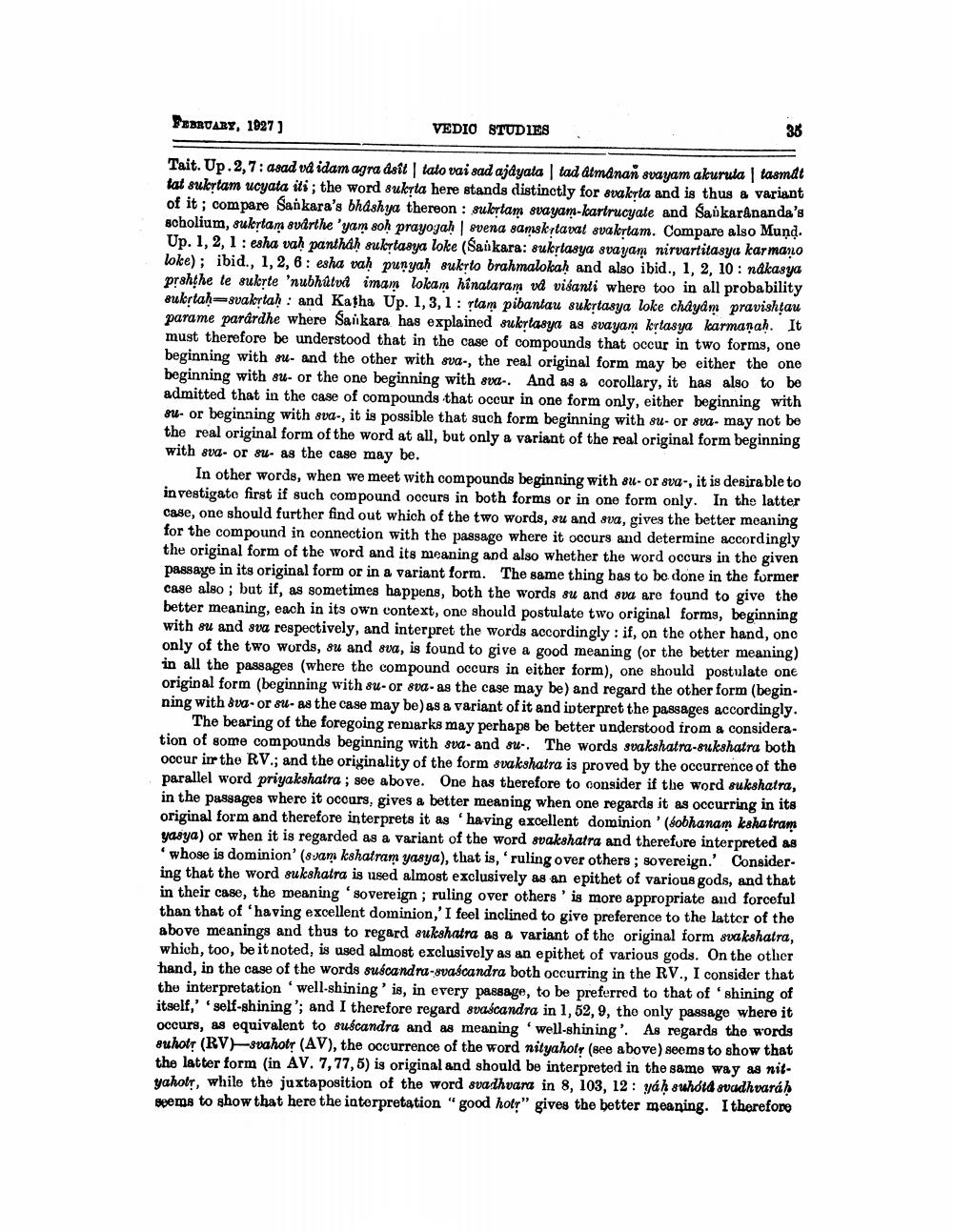________________
FEBRUARY, 1927]
Tait. Up.2,7: asad va idam agra ásit | tato vai sad ajdyata | tad atmânan svayam akuruta | tasmat tat sukṛtam ucyata iti; the word sukṛta here stands distinctly for svakṛta and is thus a variant of it; compare Sankara's bhashya thereon: sukṛtam svayam-kartrucyate and Sankarananda's scholium, sukṛtam svårthe 'yam soh prayogah | svena samskṛtavat svakṛtam. Compare also Mund. Up. 1, 2, 1: esha vah panthah sukṛtasya loke (Sankara: sukṛtasya svayam nirvartitasya karmano loke); ibid., 1, 2, 6: esha vah punyah sukṛto brahmalokaḥ and also ibid., 1, 2, 10: nakasya prahthe te sukṛte 'nubhûtva imam lokam hinataram va visanti where too in all probability eukṛtaḥ svakṛtah and Katha Up. 1, 3, 1: rtam pibantau sukṛtasya loke châyâm pravishṭau parame parardhe where Sankara has explained sukṛtasya as svayam kṛtasya karmaṇaḥ. It must therefore be understood that in the case of compounds that occur in two forms, one beginning with su- and the other with sva-, the real original form may be either the one beginning with su- or the one beginning with sva-. And as a corollary, it has also to be admitted that in the case of compounds that occur in one form only, either beginning with su- or beginning with sva-, it is possible that such form beginning with su- or sva- may not be the real original form of the word at all, but only a variant of the real original form beginning with sva- or su as the case may be.
VEDIO STUDIES
35
In other words, when we meet with compounds beginning with su- or sva-, it is desirable to investigate first if such compound occurs in both forms or in one form only. In the latter case, one should further find out which of the two words, su and sva, gives the better meaning for the compound in connection with the passage where it occurs and determine accordingly the original form of the word and its meaning and also whether the word occurs in the given passage in its original form or in a variant form. The same thing has to be done in the former case also; but if, as sometimes happens, both the words su and sva are found to give the better meaning, each in its own context, one should postulate two original forms, beginning with su and sva respectively, and interpret the words accordingly: if, on the other hand, one only of the two words, su and sea, is found to give a good meaning (or the better meaning) in all the passages (where the compound occurs in either form), one should postulate one original form (beginning with su- or sva- as the case may be) and regard the other form (begin. ning with ava-or su- as the case may be) as a variant of it and interpret the passages accordingly. The bearing of the foregoing remarks may perhaps be better understood from a consideration of some compounds beginning with sva- and su-. The words svakshatra-sukshatra both occur in the RV.; and the originality of the form svakshatra is proved by the occurrence of the parallel word priyakshatra; see above. One has therefore to consider if the word sukshatra, in the passages where it occurs, gives a better meaning when one regards it as occurring in its original form and therefore interprets it as 'having excellent dominion' (sobhanam kshatram yasya) or when it is regarded as a variant of the word svakshatra and therefore interpreted as 'whose is dominion' (sam kshatram yasya), that is, 'ruling over others; sovereign.' Considering that the word sukshatra is used almost exclusively as an epithet of various gods, and that in their case, the meaning 'sovereign; ruling over others' is more appropriate and forceful than that of 'having excellent dominion,' I feel inclined to give preference to the latter of the above meanings and thus to regard sukshatra as a variant of the original form svakshatra, which, too, be it noted, is used almost exclusively as an epithet of various gods. On the other hand, in the case of the words suscandra-svascandra both occurring in the RV., I consider that the interpretation well-shining' is, in every passage, to be preferred to that of shining of itself,' self-shining'; and I therefore regard svascandra in 1, 52, 9, the only passage where it occurs, as equivalent to suścandra and as meaning well-shining'. As regards the words suhoty (RV)-svahotṛ (AV), the occurrence of the word nityahoty (see above) seems to show that the latter form (in AV. 7,77, 5) is original and should be interpreted in the same way as nityahoty, while the juxtaposition of the word svadhvara in 8, 103, 12: yáḥ suhótá svadhvaráḥ seems to show that here the interpretation "good hoty" gives the better meaning. I therefore




